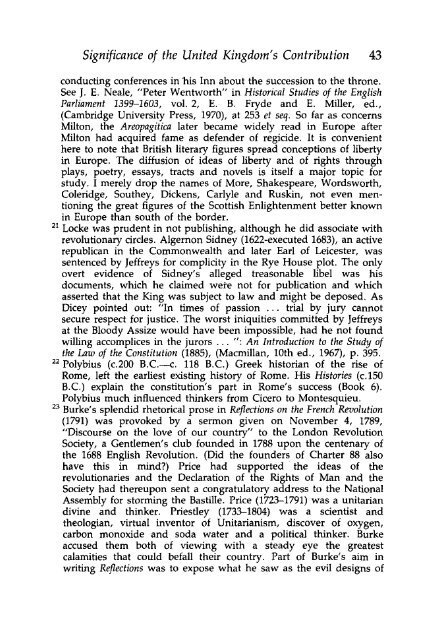The United Kingdom and Human Rights - College of Social ...
The United Kingdom and Human Rights - College of Social ...
The United Kingdom and Human Rights - College of Social ...
You also want an ePaper? Increase the reach of your titles
YUMPU automatically turns print PDFs into web optimized ePapers that Google loves.
Significance <strong>of</strong> the <strong>United</strong> <strong>Kingdom</strong>'s Contribution 43<br />
conducting conferences in his Inn about the succession to the throne.<br />
See J. E. Neale, "Peter Wentworth" in Historical Studies <strong>of</strong> the English<br />
Parliament 1399-1603, vol. 2, E. B. Fryde <strong>and</strong> E. Miller, ed.,<br />
(Cambridge University Press, 1970), at 253 et seq. So far as concerns<br />
Milton, the Areopagitica later became widely read in Europe after<br />
Milton had acquired fame as defender <strong>of</strong> regicide. It is convenient<br />
here to note that British literary figures spread conceptions <strong>of</strong> liberty<br />
in Europe. <strong>The</strong> diffusion <strong>of</strong> ideas <strong>of</strong> liberty <strong>and</strong> <strong>of</strong> rights through<br />
plays, poetry, essays, tracts <strong>and</strong> novels is itself a major topic for<br />
study. I merely drop the names <strong>of</strong> More, Shakespeare, Wordsworth,<br />
Coleridge, Southey, Dickens, Carlyle <strong>and</strong> Ruskin, not even mentioning<br />
the great figures <strong>of</strong> the Scottish Enlightenment better known<br />
in Europe than south <strong>of</strong> the border.<br />
21 Locke was prudent in not publishing, although he did associate with<br />
revolutionary circles. Algernon Sidney (1622-executed 1683), an active<br />
republican in the Commonwealth <strong>and</strong> later Earl <strong>of</strong> Leicester, was<br />
sentenced by Jeffreys for complicity in the Rye House plot. <strong>The</strong> only<br />
overt evidence <strong>of</strong> Sidney's alleged treasonable libel was his<br />
documents, which he claimed were not for publication <strong>and</strong> which<br />
asserted that the King was subject to law <strong>and</strong> might be deposed. As<br />
Dicey pointed out: "In times <strong>of</strong> passion ... trial by jury cannot<br />
secure respect for justice. <strong>The</strong> worst iniquities committed by Jeffreys<br />
at the Bloody Assize would have been impossible, had he not found<br />
willing accomplices in the jurors ... ": An Introduction to the Study <strong>of</strong><br />
the Law <strong>of</strong> the Constitution (1885), (Macmillan, 10th ed., 1967), p. 395.<br />
22 Polybius (c.200 B.C.—c. 118 B.C.) Greek historian <strong>of</strong> the rise <strong>of</strong><br />
Rome, left the earliest existing history <strong>of</strong> Rome. His Histories (c.150<br />
B.C.) explain the constitution's part in Rome's success (Book 6).<br />
Polybius much influenced thinkers from Cicero to Montesquieu.<br />
23 Burke's splendid rhetorical prose in Reflections on the French Revolution<br />
(1791) was provoked by a sermon given on November 4, 1789,<br />
"Discourse on the love <strong>of</strong> our country" to the London Revolution<br />
Society, a Gentlemen's club founded in 1788 upon the centenary <strong>of</strong><br />
the 1688 English Revolution. (Did the founders <strong>of</strong> Charter 88 also<br />
have this in mind?) Price had supported the ideas <strong>of</strong> the<br />
revolutionaries <strong>and</strong> the Declaration <strong>of</strong> the <strong>Rights</strong> <strong>of</strong> Man <strong>and</strong> the<br />
Society had thereupon sent a congratulatory address to the National<br />
Assembly for storming the Bastille. Price (1723-1791) was a Unitarian<br />
divine <strong>and</strong> thinker. Priestley (1733-1804) was a scientist <strong>and</strong><br />
theologian, virtual inventor <strong>of</strong> Unitarianism, discover <strong>of</strong> oxygen,<br />
carbon monoxide <strong>and</strong> soda water <strong>and</strong> a political thinker. Burke<br />
accused them both <strong>of</strong> viewing with a steady eye the greatest<br />
calamities that could befall their country. Part <strong>of</strong> Burke's aim in<br />
writing Reflections was to expose what he saw as the evil designs <strong>of</strong>

















